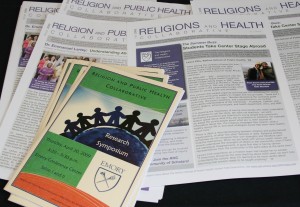Religion and Public Health Collaborative
 Emory University’s Religion and Public Health Collaborative (RPHC) is an interdisciplinary collaboration between Emory University’s Rollins School of Public Health, Nell Hodgson Woodruff School of Nursing, Candler School of Theology, and the Department of Religion. The mission of the Religion and Public Health Collaborative is to engage scholars and practitioners in world religions and public health to understand the sometimes converging, sometimes conflicting relationships of religion and public health, through teaching and research.
Emory University’s Religion and Public Health Collaborative (RPHC) is an interdisciplinary collaboration between Emory University’s Rollins School of Public Health, Nell Hodgson Woodruff School of Nursing, Candler School of Theology, and the Department of Religion. The mission of the Religion and Public Health Collaborative is to engage scholars and practitioners in world religions and public health to understand the sometimes converging, sometimes conflicting relationships of religion and public health, through teaching and research.
The Religion and Public Health Collaborative was founded in 2006 as part of the Emory University Strategic Plan, “Where Courageous Inquiry Leads.” Of the five strategic themes identified in the plan, the fourth, “Confronting the Human Condition and Human Experience,” was designed to delve into human existence of the past, present, and future through the collective lenses of humanists, scientists, artists, and social scientists. Three university-wide areas of study were identified within this theme: Religion and the Human Spirit, Global Health, and Race and Difference. Of these, the Religion and Public Health Collaborative was one of six sub-initiatives of the Religion and the Human Spirit initiative.
Today, faculty who are members of the Collaborative are drawn from the Laney Graduate School’s Departments of Sociology, Anthropology, and the Graduate Division of Religion; the Rollins School of Public Health; the Candler School of Theology; the Nell Hodgson Woodruff School of Nursing; the School of Law; and the School of Medicine. This multi-disciplinary, cross-school group brings a wealth of professional and academic perspectives to the complex relationship of religion and public health – two institutions that often share common interests but sometimes find themselves in opposition. In conflict or in alignment, however, religion is a social determinant of public health, among the political, economic, and social structures that determine the health of populations. The work of the Collaborative is to bring religion into this larger picture of the determinants of public health as they are described by the World Health Organization: “the conditions of daily life — the circumstances in which people are born, grow, live, work, and age.” Our goal is to develop innovative and transformative theories and practices in religion and public health that can be shared locally, nationally, and globally. Our faculty provide distinctive intellectual leadership to
- Explore the relationship between religion and public health in interdisciplinary scholarship, teaching, and service
- Develop academic programs that promote understanding of the impact of world religions on the health of populations
- Generate opportunities for research and practice with community partners that will help shape a broader view of religion and public health
- Engage students in the fields of theology, religion, and public health in interdisciplinary scholarship and practice.
Recent projects of the Religion and Public Health Collaborative include:
- Understanding the potential of religion and faith communities to improve population health by promoting safe water in rural communities
- Addressing areas of disagreement between religion and public health on issues such as contraception, to promote safe practices in a context of respect
- Adapting meditation techniques for middle school children to counter the culture of bullying
- Understanding the role of religion in contraceptive decisions about Latinas
- Exploring the place of religion in public health ethics
RPHC TIMELINE
View the Religion and Public Health Collaborative’s timeline and see how we continue to delve into the field of religion and public health.